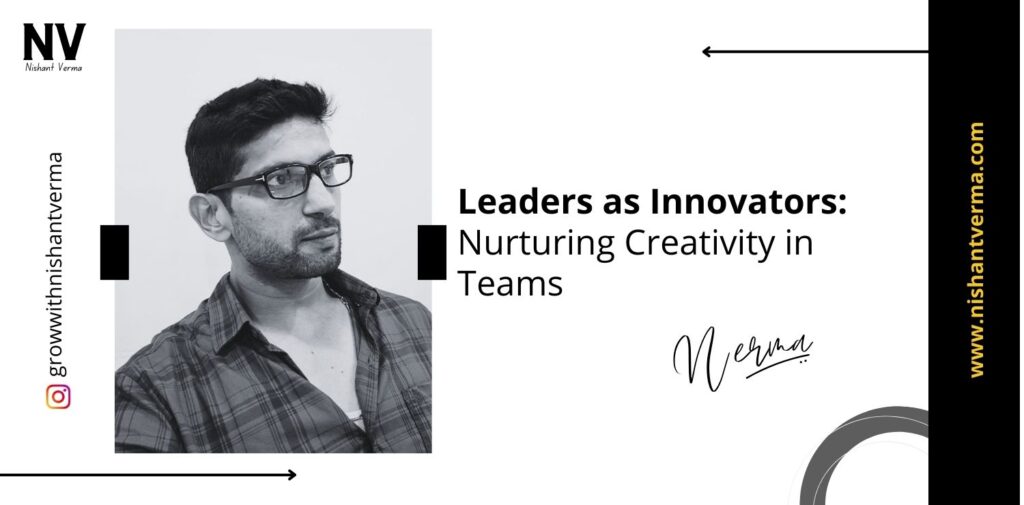Imagine leadership as a garden and nurturing creativity in teams as the vibrant flowers that bloom. This article will explore the simple yet powerful concept of leadership and creativity, delving into how leaders can cultivate a culture of innovation within their teams. Join us on this journey of understanding and fostering creativity to bring out the best in every team member.

I. The Magic of Creativity in the Workplace
Nurturing creativity in teams is like the spark that lights up a dark room. It’s about thinking outside the box, coming up with fresh ideas, and finding unique solutions to challenges. Leaders play a pivotal role in unleashing this magic within their teams.
II. Why Creativity Matters for Leaders
Let’s keep it straightforward: nurturing creativity in teams matters because:
- Innovation: Creative ideas lead to innovative solutions and advancements.
- Problem-Solving: Creative thinking helps teams overcome obstacles and find new paths.
- Employee Engagement: Fostering a creative environment boosts morale and engagement.
III. The Role of Leadership in Fostering Creativity
Role of Leadership are like gardeners tending to the soil in which nurturing creativity in teams grows. Here’s how leaders contribute:
- Encouraging Risk-Taking: Leaders create a safe space for team members to take risks and explore unconventional ideas.
- Setting an Example: Leaders inspire creativity by showcasing their willingness to think creatively and take risks.
- Providing Resources: Leaders ensure teams have the tools and resources to turn creative ideas into reality.

IV. Creating a Culture of Innovation: A Leader’s Guide
Creating a culture of innovation is like planting seeds for a bountiful harvest. Leaders can do this by:
- Encouraging Collaboration: Fostering an environment where team members collaborate and build on each other’s ideas.
- Recognizing Creativity: Acknowledging and celebrating creative efforts and achievements.
- Diversity and Inclusion: Embracing Diversity and inclusion to bring various perspectives and ideas.
V. Types of Creativity in the Workplace: Recognizing Diversity
Creativity comes in different forms. Recognizing these types helps leaders tap into the diverse creative strengths of their team:
- Artistic Creativity: Expressing ideas through visual arts, design, and aesthetics.
- Innovative Creativity: Generating new and groundbreaking ideas for products or processes.
- Problem-Solving Creativity: Applying creativity to find solutions to challenges.
VI. The Creative Process: A Simplified Journey
The creative process is like a roadmap to turning ideas into reality. Let’s break it down:
- Inspiration: The spark of an idea or a problem that needs solving.
- Idea Generation: Brainstorming and exploring various possibilities.
- Planning: Organizing and outlining how the idea can be executed.
- Execution: Bringing the idea to life through implementation.
- Evaluation: Reflecting on the outcomes and learning from the experience.
VII. Leadership Styles that Foster nurturing creativity in teams
Leadership styles impact how creativity is cultivated. Let’s simplify a few styles:
- Transformational Leadership: Inspiring and motivating team members to think creatively.
- Democratic Leadership: Involving the team in decision-making and idea generation.
- Servant Leadership: Supporting and empowering team members to unleash their creative potential.
VIII. The Importance of Feedback in the Creative Process
Importance of Feedback is like sunlight, nurturing creativity in teams and helping it grow. Leaders can provide effective feedback by:
- Positive Reinforcement: Acknowledging and praising creative efforts.
- Constructive Criticism: Offering suggestions for improvement in a positive and supportive manner.
- Open Communication: Creating a culture where team members feel comfortable sharing and receiving feedback.

IX. Empowering Teams through Creative Leadership
Empowering teams is like giving them wings to soar. Leaders empower teams by:
- Trusting Team Members: Trusting that team members can handle creative responsibilities.
- Providing Autonomy: Allowing autonomy in decision-making and creative processes.
- Encouraging Growth: Supporting professional development and learning opportunities
X. Case Studies: Real-Life Examples of Successful Creativity in Teams
Let’s draw inspiration from real-life leaders who successfully fostered nurturing creativity in teams within their teams:
- Leader A: By encouraging a culture of experimentation, Leader A’s team developed an innovative solution that boosted productivity.
- Team B: Team B, led by a leader who valued Diversity, introduced a creative approach that resulted in a successful marketing campaign.
- Organization C: Organization C’s commitment to inclusivity and open communication led to a breakthrough idea that transformed its product line.
XI. Overcoming Challenges in Fostering Creativity: Strategies for Success
Challenges are like puzzles waiting to be solved. Leaders can overcome challenges in fostering nurturing creativity in teams by:
- Managing Resistance: Addressing resistance to change through effective communication and showcasing the benefits of creativity.
- Navigating Time Constraints: Allocating dedicated time for creative thinking and imagination sessions.
- Balancing Structure and Freedom: Balancing structure and creative freedom to avoid chaos.
XII. Creativity in Remote work Teams: Adapting Strategies for Success
In the age of remote work teams, leaders need to adapt strategies for fostering nurturing creativity in teams:
- Virtual Collaboration Tools: Leveraging technology for virtual brainstorming sessions and idea sharing.
- Scheduled Creativity Sessions: Setting aside specific times for virtual creative sessions.
- Digital Idea Boards: Using digital platforms for collaborative idea generation and organization.
XIII. The Connection Between Creativity and Employee Well-being
Nurturing creativity in teams is not just about work; it’s also about the well-being of team members:
- Sense of Purpose: Engaging in creative tasks gives employees a sense of purpose and fulfillment.
- Reduced Stress: Tapping into creative outlets can serve as a stress reliever.
- Improved Morale: A workplace encouraging creativity fosters positive morale and job satisfaction.
XIV. Sustainability as a Component of Creative Leadership
Sustainability is like ensuring the creative garden flourishes for the long term. Leaders can integrate sustainability into creative processes by:
- Environmentally Conscious Practices: Encouraging eco-friendly and sustainable creative solutions.
- Social Responsibility: Promoting creativity that contributes positively to society.
- Long-Term Vision: Considering the long-term impact of creative ideas on the organization and its stakeholders.
XV.Measuring the Impact of Creativity: Metrics Simplified
Metrics are like measuring the height of the plants in the creative garden. Simplified metrics for measuring the impact of creativity include:
- Innovation Success: Tracking the successful implementation of creative ideas.
- Employee Engagement Surveys: Assessing the correlation between creativity and employee satisfaction.
- Time-to-Implementation: Measuring the efficiency of turning creative ideas into actionable solutions.
Conclusion: Leaders as Cultivators of nurturing creativity in teams
In the grand garden of leadership, leaders are the cultivators nurturing creativity in teams and innovation. As cultivators of creativity, leaders can inspire, empower, and create environments where every team member’s creative potential blooms. Let’s build workplaces where creativity is not a luxury but a necessity, where the journey of creativity is as rewarding as the destination of innovation.




